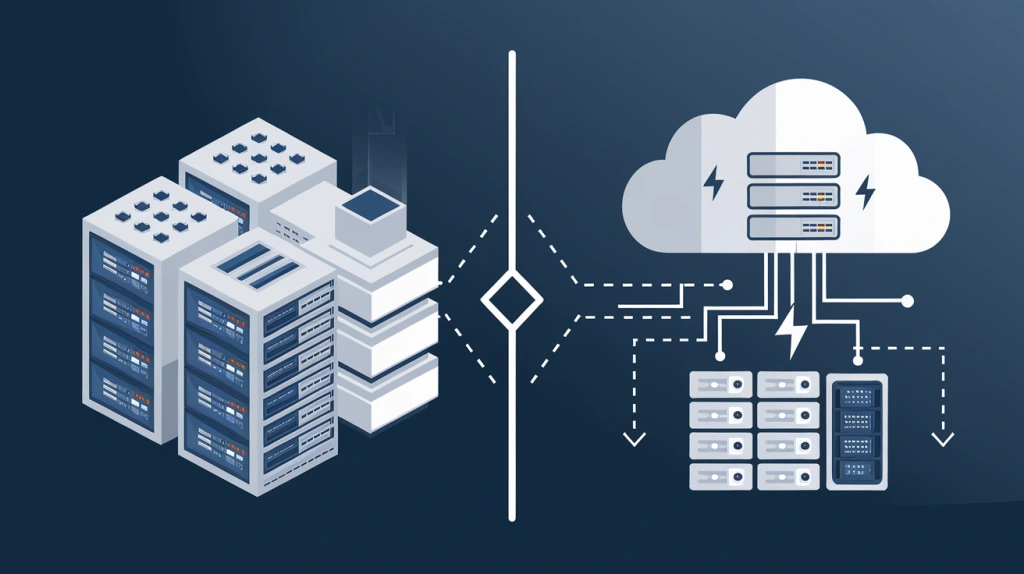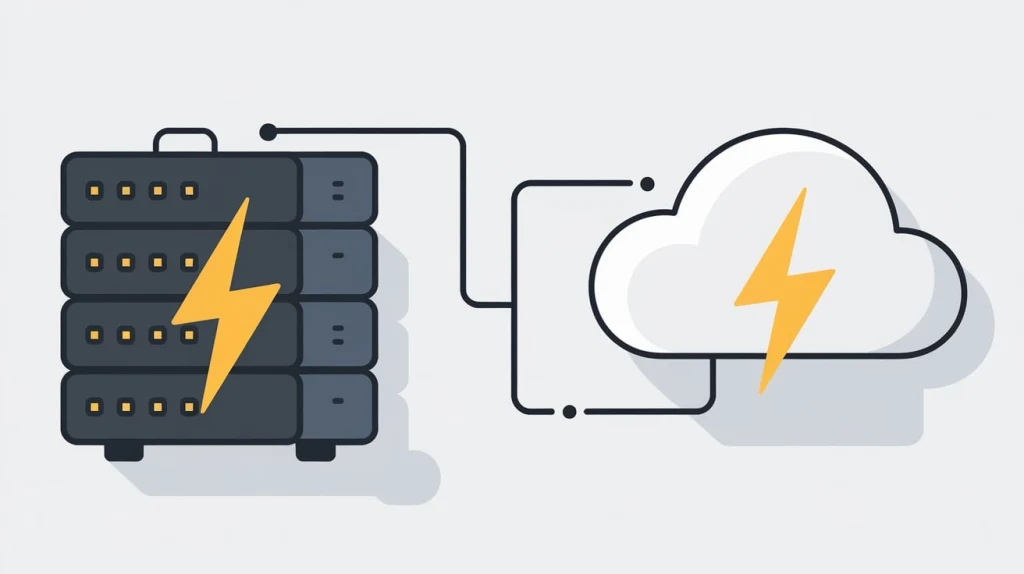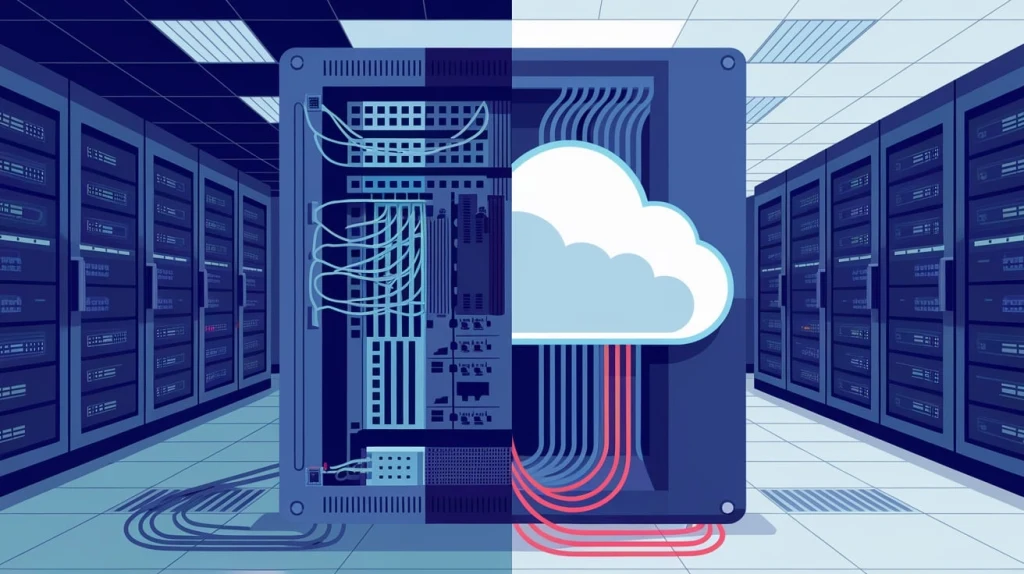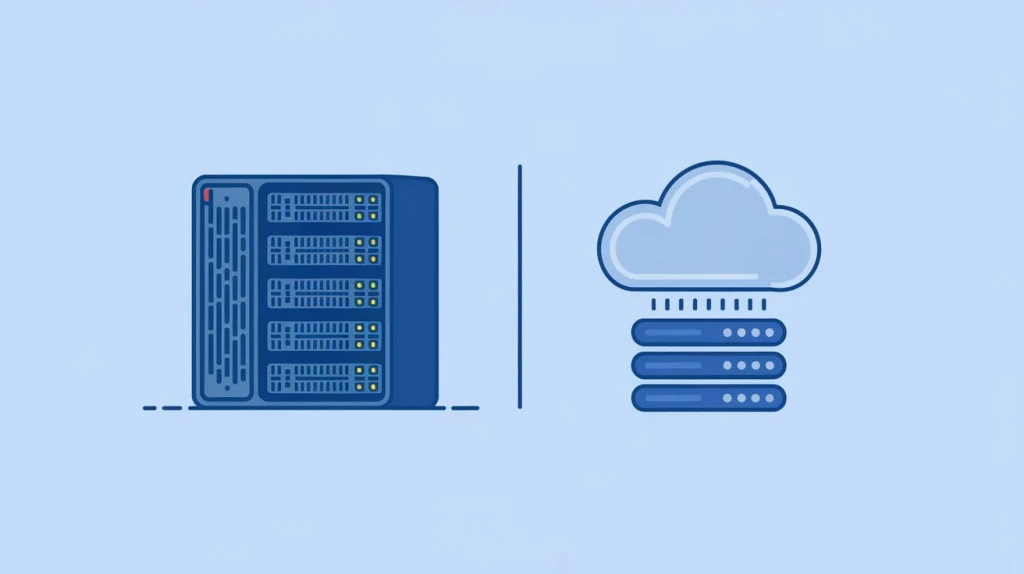Cloud Server vs Dedicated Server: Which is the right option for you?

When it comes to choosing the right server for your business and workload, you have two main options to consider, cloud server vs dedicated server.
As a leader in dedicated server hosting and cloud solutions, both options are available at ServerMania, but which option should you choose for your business?
To understand which is the right option for your needs, you need to take an in-depth look at the main differences. This guide will unwrap the differences between both worlds, expand on the comparison of dedicated and cloud server environments, and help you determine and select the best option for you.
Let’s start by asking…
What is a Cloud Server?
Cloud servers are virtual machines that provide ultimate scalability, where users adjust virtual resources to match their needs, workload, and budget. These resources include CPU (cores), RAM (memory), and storage, without having to pay for any components or hardware maintenance.
Unlike dedicated servers, virtual machines do not require time for deployment as the configuration and resources are configured virtually. Clients can dynamically increase and decrease the resources of their cloud servers, which makes them a cheap solution for businesses with dynamically changing workloads.
In short, you’re paying for what you’re using, whereas dedicated hosting provides a fixed amount of server resources, no matter whether you will need it or not. If you want to learn more, we recommend checking the history of cloud computing.

Advantages & Disadvantages:
Cloud hosting and virtual machines come with advantages and disadvantages that we need to discuss, so let’s walk you through the pros and cons.
✅ Pros:
- Instant deployment: You don’t need to wait for the initialization of a cloud server as new servers are created immediately and access is shared momentarily.
- Scalable resources: The resources of a cloud server are variable and dynamically changing, as per the client’s requirements, workload, and scale of operation.
- Cost-effectiveness: With cloud hosting, there are no upfront payments, maintenance fees, and initialization prices—you pay monthly for your services.
- Uptime/availability: Cloud servers are renowned for their uptime and accessibility, so as long as you’re connected to the internet, you can rely on uninterrupted access.
- Data redundancy: You can store your data on multiple servers or locations within the cloud infrastructure, ensuring that if one server fails, your data remains safe.
❌ Cons:
- Limited resources: The limitations of computing power, storage, and memory make cloud servers unsuitable for large-scale operations and workloads.
- Shared environment: Shared hosting involves other users on the same physical machine, simultaneously using the same server that hosts your cloud environment.
- Internet dependency: Cloud servers and their complete network dependency can be an obstacle due to potential access restrictions, lag, and performance delay.
The biggest advantage here is ServerMania’s cloud server hosting price in comparison to 3 different cloud computing platforms such as AWS, Google Cloud and Azure. The right choice is strictly based on what you need, the scale of the operation, and your specific organization’s workflow.

What is a Dedicated Server?
A dedicated server is a physical server configuration that is typically hosted in a data center and is mainly used by one client. In contrast to cloud hosting, dedicated server resources are fixed, since replacing hardware to increase computing power or storage, requires time and on-site interactions.
Unlike the shared hosting environment with cloud hosting, a dedicated server strongly relies on physical hardware with dedicated resources. The hardware involves everything—(CPU, GPU, RAM, LAN Card, HDD, SSD, or NVMe, Motherboard, and Power Supply), which is physically stored in a server chassis.
This is not everything however, a dedicated server requires an operating system, network settings, disk space management, software installation, and maintenance. Yes, these types of servers are needy, and probably more expensive when comparing cloud and dedicated hosting, but no other users are involved.
So, dedicated resources remain the best option for large-scale operations, businesses with accessibility requirements, and most importantly high processing power.
Advantages & Disadvantages:
Based on your hosting provider, dedicated servers also come with a handful of advantages and disadvantages, so let’s break this down:
✅ Pros:
- Sufficient resources: With a dedicated server, you’re not limited in the configuration of processing power, memory, and storage, thus you design the server’s foundation.
- Full customization: Everything from the server hardware components to the operating system and specific applications can be adjusted to meet your objectives and goals.
- Higher performance: The dedicated, physical servers, are much more powerful when compared to shared hosting, considering the absence of resource sharing.
- Customized hosting: The hosting environment is also fully customizable, whether it’s on-premises under your IT department’s watch or in a secure data center full of IT technicians.
- Reliable management: Even though more time is required, fundamental changes with dedicated hosting are possible, including operating systems, hardware, and applications.
❌ Cons:
- Considerably high cost: With dedicated servers, upfront payment for initialization may be required (based on the provider) and ongoing management fees may occur.
- Limitation in scalability: The hardware resources of a dedicated hosting service can be changed, but cannot dynamically scale to align with the ever-changing demand for processing power.
- Maintenance requirement: Dedicated servers require a high level of maintenance such as hardware replacement, updates, and security patches, whether it’s self-provided or paid for.
The main benefit of dedicated servers is that you won’t be having unexpected spikes in your monthly payments, as your hardware utilization suddenly grows.
Hence, both cloud servers and dedicated servers provide significant advantages and disadvantages.

Cloud Vs Dedicated Server – Ultimate Comparison:
Now that we’ve unwrapped the main differences between cloud and dedicated servers, it’s time to take an in-depth look at a comprehensive comparison. We will cover all of the main points that you might be interested in, especially if you wonder which hosting solution best aligns with your performance needs.
Here is the ultimate comparison for cloud vs dedicated hosting:
| COMPARISON | CLOUD | DEDICATED |
| Infrastructure | Virtual infrastructure and fully managed service with a high level of network security. | An entire server configuration, with dedicated hardware, stored on-premises or in a hosting center. |
| Performance | High performance, but prone to occasional lag due to too many processing requests. | Highest performance possible, due to the dedicated infrastructure and hardware components. |
| Investment | No need to purchase, host, or maintain the hardware. | Higher investment is needed for colocation, and lower for housing. |
| Scalability | Quick resource scaling, whenever needed for as long as needed. | On-site intervention and hardware changes are required for scaling. |
| Deployment | The deployment of your share is quick, easy, and doesn’t require any configuration. | The deployment period will require time due to configuration and the need for on-site interactions. |
| Customization | Limited hardware and software customization as public cloud providers offer premade systems. | Complete control and freedom for customizing everything from HW pieces to software and applications. |
| Management | The client uses a dashboard, while all server management tasks are handled by the provider. | You can rely on managed hosting services for your dedicated server or self-manage everything yourself. |
| Redundancy | The best redundant infrastructure possible, with many physical servers on standby. | A single physical server, where more redundancy means higher cost. |
| Migration | The data migration is quick and easy, while it doesn’t require on-site interactions. | Migration is possible, but in most cases, it’s slow, as it requires planning to avoid downtime. |
| Software | Limited options with predefined software and applications. | Fully customizable software, applications, and OS. |
| Integration | Cloud providers have a preset of tools that you can integrate for your virtual server. | A complete freedom to integrate any tool you need, but if you lack in-house expertise, it brings risks. |
| Availability | Full availability and access as long as you have a reliable internet connection. | Limited remote accessibility due to potential network issues, unless it’s being hosted on your premises. |
Now that you have a good grasp of the basics when comparing cloud hosting vs dedicated servers, you may be torn between flexibility and power. Well, there are even more managed services such as hybrid cloud hosting solutions. We recommend exploring what ServerMania has to offer and redefine your cloud experience with AraCloud, our IaaS public cloud hosting solution.
Cloud Vs Dedicated Servers – 5 Critical Factors to Consider
The most important factor to consider is how many resources you need for your workflow. However, to help you pick the right server type, let’s review all the critical factors that you need to take into account.
1. Budget Allocation
Your budget is one of the major factors that will determine the go-to hosting model for your operation. Dedicated servers come with a significant need for technical knowledge unless you’re paying for complete management, which doesn’t even require a hosting space.
In contrast, the managed cloud server provides complete and ready infrastructure, without additional payments involved. Using the virtualization technology, you only have to cover the monthly payment.
2. Uptime & Processing
Another factor that will determine the type of server you need is the uptime and computing resources you require. The premade configurations and cloud resources that you’ll get with a cloud server may not always align with the requirements for your operation, hence dedicated server may be the only solution.
3. Applications & Tools
Sometimes, even with a private cloud server, the need for specific applications and tool integration for big data analytics may be beyond what cloud hosting offers. Considering the fully-customizable nature of dedicated servers, in many cases, cloud service providers may not be able to fulfill specific needs.
4. Goals & Objectives
There are many hosting solutions available to fulfill unique objectives and goals, but if you require high CPU processing and reliable handling of sensitive data, a dedicated server is the way to go. In contrast, if your operation is lightweight, and without urgency, the cloud hosting models excel in compatibility.
5. Security & Protection
The security of your system is among the most important factors when choosing between cloud and dedicated hosting. While cloud providers offer strong security measures, some vulnerabilities may arise considering the nature of the shared hosting. In turn, dedicated servers offer full control over security.
When to Choose a Cloud Server?
Certain operations and workflows are best suited for cloud server hosting, and we’ve outlined a few key examples to help you make an informed decision. Here are some quick examples:
- eCommerce stores, blogs, and websites with seasonal traffic
- Lightweight applications & web apps with unpredictable usage
- Urgent tasks and applications that require instant deployment
- Operations that require uninterrupted hosting and no downtime
In short, cloud hosting is ideal for individuals and businesses that require flexibility, and management of lightweight apps. If need to execute mission-critical operations in an uninterrupted environment such as managing data or handling streaming and content delivery, you should consider the dedicated servers.
When to Choose a Dedicated Server?
Similarly to the cloud hosting solutions, many operations and workflows are unfit for virtual servers due to the involved complexity. Let’s name a few:
- Large-scale and heavily loaded online multiplayer game servers
- Applications that require a lot of computing resources/memory
- Websites with heavy traffic, and consistently huge user base
- Large databases, which are unsuitable for any shared hosting
Hence, while cloud servers offer high flexibility, some operations require dedicated infrastructure, so choosing the correct hosting model depends on the workflow’s complexity. With dedicated servers you gain full control over the hosting environment, allowing you to support highly demanding operations.

ServerMania – Your Go-To Destination for Dedicated and Cloud Servers
Whether you need a dedicated or a cloud server, you first need to discover a reliable hosting provider, regardless of whether you’re going to purchase a server or rent one.
At ServerMania, we provide both dedicated and cloud servers, as well as hosting solutions that will cover any requirements and workflows. If you’re about to purchase a dedicated server we recommend exploring our Colocation services and our guide on how much colocation costs. In contrast, if you’re looking for affordable cloud hosting or simply want to explore server types, you’re welcome to get in touch with us. Our team of experts are always available to help!
Was this page helpful?

